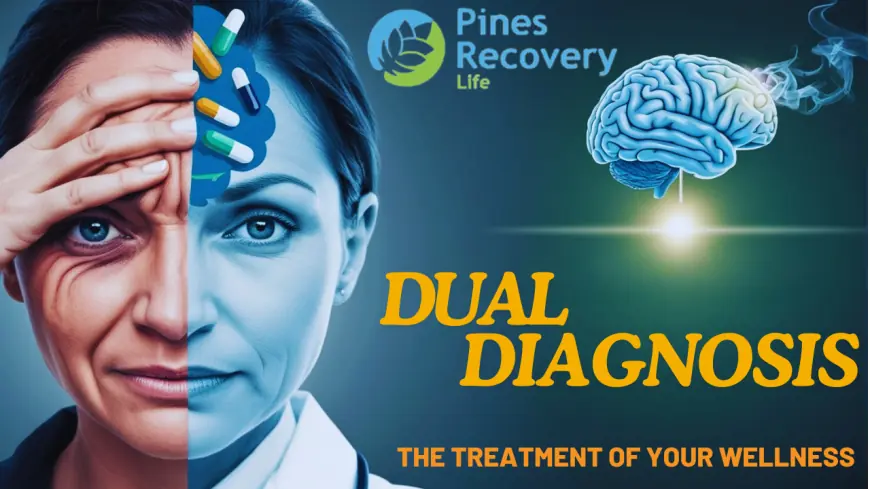Dual Diagnosis: Wide Treatment for Co-Occurring Disorders
Comprehensive dual diagnosis treatment for co-occurring disorders, addressing mental health and addiction for lasting recovery and wellness.

In today's complex healthcare scenery, addressing mental health and substance use disorders requires a nuanced and combined approach. When an individual experiences both a mental health disorder and a substance use disorder at once, it is referred to as a dual diagnosis or co-occurring disorders. This intersection presents unique challenges, as each condition can impair the other, making treatment more intricate. Recognizing and effectively treating dual diagnosis is supreme for achieving sustained recovery and improving overall quality of life.
Defining Dual Diagnosis
Dual diagnosis involves the concurrent attendance of a mental health disorder and a substance use disorder. This means an individual is battling both conditions at the same time. For instance, a person strength agonize from depression while also struggling with alcohol addiction. The relationship between these disorders is complex; mental health issues can lead individuals to self-medicate with drugs or alcohol, while substance abuse can trigger or worsen mental health conditions.
Prevalence and Importance
The frequency of dual diagnosis is more common than one might accept. Studies indicate that a significant portion of individuals with substance use disorders also have co-occurring mental health disorders. This join underscores the necessity for integrated treatment approaches that address both issues simultaneously. Without complete care, treating only one disorder often leads to incomplete recovery and a higher likelihood of relapse.
Common Mental Health Disorders Associated with Dual Diagnosis
Several mental health disorders frequently co-occur with substance use disorders:
· Depression: Persistent feelings of sadness and impossibility can lead individuals to use substances as a coping mechanism.
· Anxiety Disorders: Chronic anxiety may drive individuals to look for relief through drugs or alcohol.
· Bipolar Disorder: Characterized by extreme mood swings, individuals might use substances to manage their highs and lows.
· Post-Traumatic Stress Disorder (PTSD): Trauma survivors may turn to substances to numb distressing memories or emotions.
· Schizophrenia: Individuals may use drugs or alcohol to cope with symptoms like hallucinations or delusions.
Challenges in Diagnosing Dual Diagnosis
Diagnosing dual diagnosis is particularly challenging due to the meeting symptoms of mental health and substance use disorders. Substance abuse can mask or mimic psychiatric symptoms, making it difficult to determine whether the mental health disorder is primary or substance-induced. Wide-ranging assessment by skilled professionals is essential to differentiate between the two and develop an effective treatment plan.
Integrated Treatment Approaches
Effective management of dual diagnosis requires an integrated treatment approach, addressing both the mental health disorder and the substance use disorder concurrently. Key components include:
1. Comprehensive Assessment
A detailed assessment helps in understanding the extent of both disorders, their interplay, and the individual's unique needs.
2. Individualized Treatment Plans
Tailoring treatment plans to address specific challenges ensures that both disorders are managed effectively.
3. Behavioral Therapies
Evidence-based therapies such as Cognitive Behavioral Therapy (CBT) and Dialectical Behavior Therapy (DBT) are effective in addressing co-occurring disorders. These therapies help individuals develop coping strategies, modify negative thought patterns, and manage emotions.
4. Medication Management
In some cases, medications may be prescribed to manage psychiatric symptoms or assist with substance withdrawal and cravings. It's crucial that medication management is closely monitored to prevent potential interactions and ensure efficacy.
5. Supportive Services
Incorporating family therapy, support groups, and vocational rehabilitation can provide a holistic support system, aiding in recovery and reducing the risk of relapse.
The Role of Dual Diagnosis Treatment Centers
Specialized dual diagnosis treatment centers are equipped to handle the complexities of co-occurring disorders. These centers offer integrated care, bringing together mental health professionals, addiction specialists, and medical personnel to provide comprehensive treatment. The collaborative approach ensures that all aspects of an individual's health are addressed, promoting sustained recovery.
Benefits of Integrated Dual Diagnosis Treatment
Engaging in an integrated dual diagnosis treatment program offers numerous benefits:
· Improved Outcomes: Simultaneously addressing both disorders reduces the risk of relapse and promotes long-term recovery.
· Holistic Care: Comprehensive treatment plans consider all facets of an individual's well-being, including physical health, mental health, and social support.
· Coordinated Care: Collaboration among healthcare providers ensures consistent and effective treatment strategies.
· Enhanced Coping Strategies: Individuals learn skills to manage both their mental health symptoms and substance use triggers.
Seeking Help: Steps to Take
If you or a loved one is struggling with a dual diagnosis, consider the following steps:
1. Consult a Healthcare Professional: Reach out to a doctor, therapist, or counselor experienced in co-occurring disorders for an assessment.
2. Research Treatment Centers: Look for facilities specializing in dual diagnosis treatment to ensure comprehensive care.
3. Engage in Support Groups: Connecting with others facing similar challenges can provide encouragement and understanding.
4. Develop a Support Network: Involve family and friends in the recovery process to build a strong support system.
Navigating the complexities of dual diagnosis requires a compassionate, informed, and integrated approach. By addressing both mental health and substance use disorders concurrently, individuals are better positioned to achieve lasting recovery and improved quality of life. Specialized dual diagnosis treatment centers play a pivotal role in providing the necessary resources, expertise, and support to guide individuals on their journey to wellness.
What's Your Reaction?
 Like
0
Like
0
 Dislike
0
Dislike
0
 Love
0
Love
0
 Funny
0
Funny
0
 Angry
0
Angry
0
 Sad
0
Sad
0
 Wow
0
Wow
0






















































